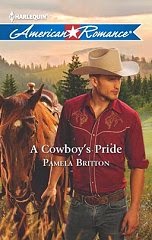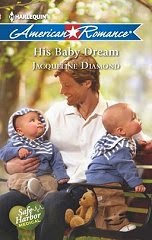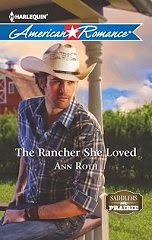



For the first part of the feature on launch author Barbara Bretton, please see October 12.
Photos--
Top: Barbara says, "The badly edited picture is the Big Dinner invitation to celebrate HAR's launch. The venue was changed to Sign of the Dove. Elda Minger and I shared a cab with Sandra Brown who was then and is now one of the nicest (and most beautiful) women I've ever met. Elda writes for Harlequin and Berkley these days and I can say quite honestly that I wouldn't have survived that first big conference and the launch without her friendship."
Center 1: Vivian Stephens, the creator of Harlequin American.
Center 2: This is the "command invitation" Barbara received to a business meeting that will remain burned in her memory forever. She wrote: "When they locked the doors behind us and said, 'You don't need an agent,' at least thirty un-agented writers made plans to immediately connect with representation. I was agented seventy-two hours later!"
Bottom: A photo of the original oil painting for The Sweetest of Debts, Barbara's second book.
Q & A:
1) How long have you been published? What was your very first book?
Twenty-five years this year. My first book was LOVE CHANGES, a launch title for Harlequin American.
2) Describe your favorite Harlequin American Romance(s) that you wrote. How many total did you do?
My favorite was SENTIMENTAL JOURNEY, one of the Century of American Romances (known as Nostalgia books at the time.) It dealt with the home front during World War II and remains one of the most perfect writing experiences of my life.
3) How was the Harlequin American Romance line different from the other Harlequin lines?
American was an anomaly at the time. We were dealing with a kind of romantic reality that didn't exist anywhere else in the early 1980s. Beta heroes, flawed heroines, characters who went to the supermarket and struggled to pay bills, and even had other lovers in their past. It all sounds kind of ho-hum from our 21st century perspective, but trust me, it was news back then.
4) How did the Harlequin American Romances line change over the years you wrote for it?
As a writer, I loved the more realistic focus but we were out-glitzed by Loveswept and Intimate Moments, both of which launched the same time we did. They provided larger than life romances while we provided slice of life. Our readers loved us but we didn't have as many of them as we (or Harlequin, for that matter) wanted so the changes began. The heroes became sexier. The heroines, less flawed. I was able to introduce action into the books with my PAX series of "spy" novels (PLAYING FOR TIME was the first). Then the doors blew wide open and HAR became the home for romantic comedies, dramas, even paranormal titles. Dallas Schulze (a good friend) wrote a book about a genie! I wrote about an invisible man. Anne Stuart wrote about absolutely everything! And there's Cathy Gillen Thacker, whose romantic comedies and warm family stories have become a mainstay at American over the years.
5) Has writing for Harlequin American help you in your single-title career? (or where have you gone since HAR)
Did writing for HAR help me in my single-title career? Let me count the ways! Category teaches you discipline, pacing, the importance of characters a reader can identify with on page one.
The phrase "breaking out" as applied to moving from category to single title has always bothered me. The implication is that category is some kind of jail from which a writer needs to escape. I moved away from category because writing longer was my natural voice and always had been. I had to work harder than most to make sure I concentrated on the romance between the hero and heroine and not veer off into one of those tempting sub-plots. Except for a half-dozen Janet Daileys, I had never read a category when I sold my first book to Vivian but that quickly changed and I was hooked.
I still come up with category ideas that I don't have time to pursue. I still love and respect the genre. Everything I know about writing popular fiction I learned while writing category. It needs no validation from me or anyone else. It's a great place to start, a great place to be, and a great place to stay.
Instead of asking us when we're going to break out, our critics should be asking themselves how they can break in.
6). Describe a moment you remember related to Harlequin American Romance, either reading one, or a fan moment, or an editor moment, or….
I've told this many times but here we go:
Mary was my very first not-related-to-me reader. She sent me my very first fan letter back in March 1983. (You'll have to excuse the number of times I use the word "first" in this post but there's no way around it. It was a time of firsts for me.)
Let me set the stage. LOVE CHANGES was one of the launch books for Harlequin American and had come out in Reader Service but was still a few weeks from hitting the book stores. I was published . . . but not really. Somewhere out there I hoped people were reading me but if they were they were being very quiet about it.
We were living in North Babylon on Long Island at the time and every morning I would drop my husband off at the LIRR station in Babylon then stop by the post office at Sunset City (a strip mall on Deer Park Avenue with, among other delights, a video store and the wonderful Italian Food World) and check my PO box for mail. I don't really know what I was expecting but I was a brand new author and hope truly springs eternal. So can you imagine my absolute shock when I unlocked the box that morning in late March of '83 and found one small letter waiting for me!
It was from Mary Preisinger who was living in West Islip at the time, written in bright green ink, and her words made me cry. "I loved your book," she wrote. "Reading it took me back to the time when my husband was still alive and we would drive out to Montauk and walk the beach. Thank you for giving me back those memories."
I'm telling you winning the Pulitzer Prize (For romance? Not likely!) or hitting the New York Times could not have made me happier than that one small letter did. My words had touched a stranger's heart! It was the most amazing, wonderful, powerful, exhilarating experience of my life.
Now here's where it gets a wee bit weird. I turned into a stalker. Not in a bad way (don't all stalkers say that?) but West Islip was just one town over and I was really, really thrilled about my fan letter so I ran home, looked Mary's phone number up in the directory and called her. I know I should be embarrassed but I'm not. I didn't know a thing about author etiquette back then. I definitely didn't have a clue about how to be cool. I just did what my heart told me to do and thank God! That impulsive phone call resulted in a twenty-five year friendship that enriched my life in ways I can't begin to count. She knitted some gorgeous afghans for me. I fumbled my way through shawls and lap robes for her.
Mary and I talked like old friends. She invited me to visit her one day for lunch and I did. Over the years we shared books and laughter, secrets and tears. I moved to central NJ. She moved to Salem, Massachusetts, then back to Long Island and then finally to Ohio. But we never lost touch. Not for a minute.
Mary's death this spring was a tremendous loss.
7) Do you hear from your Harlequin American readers who have also read your single titles or other works? What do they say?
Not too often. It's been ten years since my last American but when I do hear from a reader who remembers my time there, they're usually writing about SENTIMENTAL JOURNEY, my 1940s book for Century of American Romance. My category readership was separate from my time travel readership which was separate from my single title readership. I'm not sure why it happened that way for me but it did.
8) Harlequin American Romance is 25 years old. Describe writing some of the first books for the line. Were there any taboos? Words you couldn’t use? What were the covers like? That sort of thing….
We didn't write on proposal back in the beginning. We sent in completed manuscripts and crossed our fingers. Initially, babies and children weren't welcome in the books. I think Anne McAllister was the first to break that particular taboo. My first book (LOVE CHANGES) featured a heroine who was sterile and remained so. No miracle pregnancy happy ending. Probably not the wisest choice from a sales standpoint but Vivian gave me free rein and the writer in me was delighted.
Our covers were elegant and understated in a time when flashy and sexy was coming into its own. Our books were more realistic in a time when larger than life was taking over the entertainment world. This was the DYNASTY/DALLAS era so you can understand we were definitely bucking the trend set by Intimate Moments and Loveswept. We were the underdog, the one who metaphorically hung on by the skin of our teeth but now, twenty-five years later, look who's still standing!!
9) Anything else?
American launched back in the era of Editors as Stars and Vivian was the Star of Stars. It's been twenty-five years but her advice (not to mention her charisma!) still resonates.
"Run your own race. This isn't a contest to reach the finish line first. Work at your own speed and don't apologize."
"Your readers will find you. They may not be as many as Writer X or Writer Y enjoys but they'll be yours. Don't disappoint them."
She believed that where you came from informed your work in ways that I'd never thought about. I mean, I was a working class kid from Queens, living in a working class suburb on Long Island. What could my experience possibly bring to a romance novel? Vivian's guidance led me to find out.
She asked me a question early on in my career. A simple question but probably the most important one I've ever been asked. "Where do you see yourself in five years?"
I didn't have to think about my answer. "Still writing," I said.
And I am.
Thanks, Vivian
And now, Michele Dunaway notes: Thanks Barbara! Readers, stay tuned to tomorrow, when we'll feature Debbie Macomber's thoughts!





3 comments:
I love reading about the beginnings of the American Romance line and the writers who were the first ones to write for the category.
Thanks, Barbara, for sharing a bit of your HAR history.
Ellen, it was an experience that can't be duplicated!
Hi, Estella. I was delighted to have the chance to share.
Post a Comment